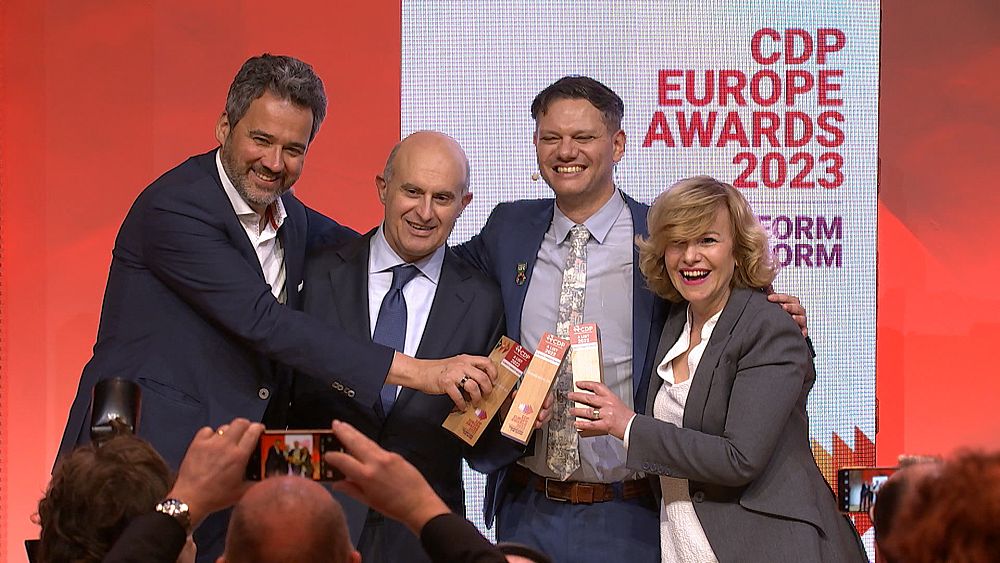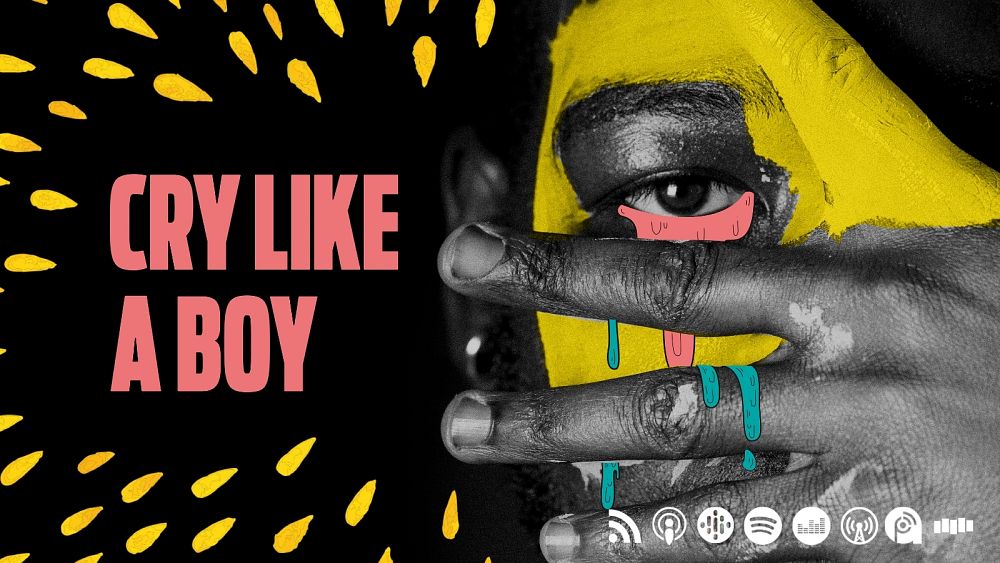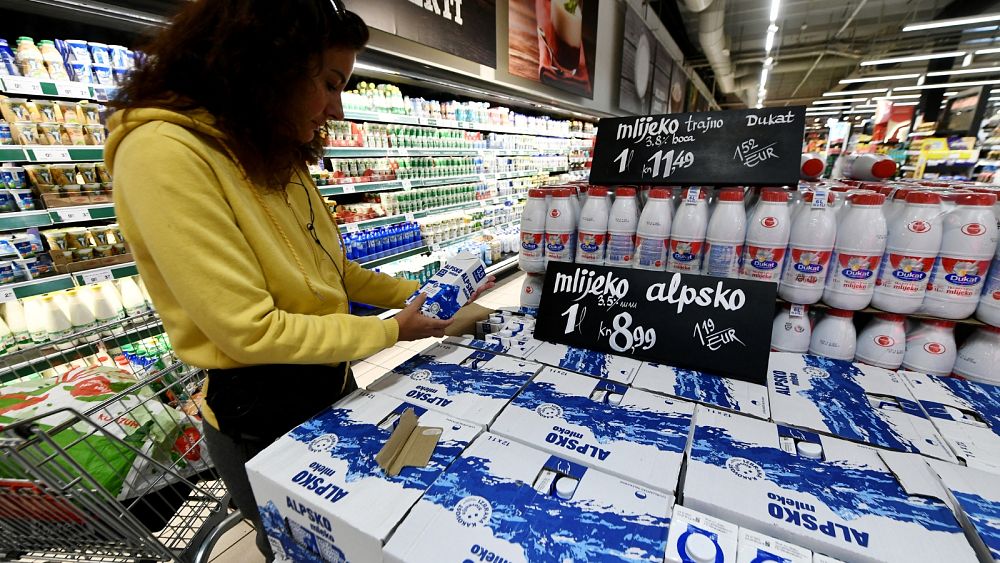
The 2023 CDP awards have been made in Paris at the Louis Vuitton Foundation. The CDP is the non-profit organisation that runs the world’s environmental reporting system. According to their latest reports, only 5% of companies in Europe are putting plans in place to reach the 1.5° climate change goal. The awards are essentially all about celebrating companies and cities paving the way.
Transforming cities
On the front line, of course, local authorities doing their best to transform Europe cities.
“Investors take a look in which kind of cities they want to invest,” says the Mayor of Turku in Finland, Minna Arve. “And if the city wants to invest in the future together with the businesses, that’s a great deal. And for the citizens, you have to, of course, think about how and why that is good for them as well. It’s about cleaner air. It’s about better transportation. It’s about, in our case, a cleaner harbour and our archipelago. So you have to speak with the same language. If you are just dealing with issues on the high level, then you may not connect with other people so well. But what you you are quite close in the city is you are really close to your residents. You have accountability and then you have the words to discuss why this is important.
“The great difficulty in this moment is when we look at the needs of our citizens,” says Porto Mayor Rui Moreira . “I spoke today and explained that 13% of the population of Porto lives in social housing. We are making a great investment in social housing so that it can be more environmentally sustainable, environmentally sustainable, and we have done it through replacing windows, roofing and everything else. We want those buildings to produce energy. But what I was explaining is that these inhabitants of ours, in a first moment, will want to consume more energy, because what are they going to want? If energy is cheaper, then they will want to have more energy to heat their house during the winter until we can then get into a stabilisation phase of energy production, that doesn’t demand more energy from us. And that’s going to be very difficult work, especially when we want to achieve carbon neutrality in 2030. How are we going to achieve that? Mobilizing the private sector, mobilizing the private sector.
“People owning their own homes, giving them tax benefits in case they adopt measures of substitution of fuels that they use to heat their homes and for the energy that they have in their homes. What we are doing in public transport, also using the PRR (Recovery and Resilience Plan), we are making a very big change very big change regarding that matter and then what we also have in mind and we have promised and we have fulfilled always the goals, to double the green area in the city of Porto in the next ten years. If we can do that, it’s sustainable to make this change and we believe that the cities that make the change the fastest this is going to be less painful for cities and it will be an opportunity.
“I was trying to explain here that the cities, this is a bit like the dentist: the cities that go to the dentist first, will have fewer toothaches than the cities that do this at the end and we’re all going to do it.”
Companies leading the way
The CDP Awards is all about ranking. Top marks for all those who are actively implementing the COP 15 biodiversity deal that was clinched in Montreal, Canada last year.
“The world and the entrepreneurial ecosystem splits, let’s say, into three;” says José Manuel Entrecanales, CEO of Acciona. “With a lot of overlap, but three: those that we do for conviction this model of changing and decarbonisation. Those who also do it because it’s an opportunity and those who don’t believe that it’s an opportunity and also don’t have the conviction.
“For all of that segment who don’t believe in it and also don’t believe that there’s a chance,
if we want the change to happen, I personally am convinced that it has to happen, then there’s no choice but to regulate it. And regulation will be difficult for all of us to comply with, logically, because the regulations will be restrictive and difficult to comply with.
But those of us who are more prepared and more advanced will have an advantage that will pay for the efforts of many years.”
“I would talk less about the green economy than the circular economy,” says Hélène Valade, Director of Environment at LVMH. “That is to say the one that will make sure that
that products are eco-designed, i.e. they use for example recycled fibres or innovative materials. The circular economy also means making sure that our products that are… that last and are passed on from generation to generation, well, we give them a second life through repair services that allow them to be used for a very long time. And then circularity, that also means to give…, to revive these products in a different way. So we created Nona Source which is a platform for reselling fabrics that are not used in a number of houses and so they’re sold on to others or externally to young designers who wouldn’t have had access, who wouldn’t have had access to these quality fabrics at the market price. That’s it. So, how can we limit the environmental footprint of our products through this circularity, creative circularity? We call it that at LVMH because, basically, the designers start with materials which, by definition, are nature-friendly to create something and then, to break the classical codes of beauty to make the sustainable desirable.”
“L’Oréal works like many industries for years and years already, in an extremely committed way on raw materials, on packaging on CO2 emissions, with results which is why we got a triple-A from CDP,” says Barbara Lavernos, Deputy CEO at L’Oréal. “So if I have a new dream for 2023, is to engage the entire tech ecosystem with us. Because we are in this new digital era and now the CO2 emissions the water scarcity is also connected to the issues of this digitalization of the world we have to, in the same way as well as packaging, and that’s why we need to be able to do that as seriously as the -1.5 degree trajectory.
Everything around tech and IT must be transformed with the tech giants so that we can have a real trajectory with them. It’s important for L’Oréal, but it’s important for the whole world.”
“We have a statement,” says Jeroen Pijpkema, CEO of Triodos. “We change, we finance change and we change finance. So on both topics, I do hope to inspire my colleagues in the financial industry, in the Netherlands and in Europe, to follow our example of being net zero in 2035, on lending activities and on investment activities.
“And secondly, in terms of finance change, last year we introduced the bio-based mortgage where we give a discount to clients who built their houses with natural-based products and components. And I would also invite my competitors in other countries and in the Netherlands to follow that example and to also stimulate and reward clients who do the right thing for Biodiversity and climate.”
Regulating adherence
As the EU Green Deal becomes a reality, cities and companies will have to adhere to a number of national and European policies over the next few years and decades. ESMA is the European Markets regulator. Do they have any advice for them?
“Greenwashing is a risk, particularly when we look at the outcome that investors get at the end of the day,” ESMA chair Verena Ross. “So from our perspectives as European Securities and Markets Authority, it is all about making sure that there is sufficient information, transparency about what actually is being sold to the retail investor so that the retail investor can make his or her choices on how to support sustainable investment goals and make sure that the information is properly displayed and is fair.”
For the EU commissioner responsible for justice Didier Reynders, all these EU rules and regulations will be a game-changer for the planet. He’s working more and more with his colleague, the EU climate chief Frans Timmermans.
“It’s a game changer because we are going to a mandatory approach. Until now it was possible to work on a voluntary approach on the basis of some of the UN guidelines or OECD guidelines for the environment, for human rights. Also in the implementation of the Paris Agreement. Now, for the large companies, we will ask them to come up with a transition plan to explain what they are doing to reach the same goals in the Paris Agreement. And of course, for the directors, it will be important to take on board the new definition of the interest of the company: in the interests of the company, you have all sorts of possible negative impacts of your operations on the environment. So it’s a real game changer and I’m hoping that will have the support of the parliament but also from the council to do that.
“Of course, it’s very important to go further than the actual, again, voluntary approach, and I thank CDP for such an action about this kind of process. But now what we will ask is to apply all the international conventions signed and ratified by the European Union. Think about biodiversity. There are some conventions and now it’s very important to ask the company to take care of it. So we are doing that was a due diligence process. So we will ask the companies to analyse and to assess the possible negative impacts of their operations on the biodiversity, but not only the operations of the company itself, but of this all the supply chain and the value chain. That’s very important to go very far in the value chain, the entire value chain, in fact.
And what global impacts does he think can be expected from the EU’s new perspective on the duty of care of directors?
“To be concrete like the GDPR , we try to come up with global standards. So we start, of course, with such a level playing field in Europe for all different companies, for companies from third countries working on the internal market. Also, we ask to all the companies I said in the supply chain, the value chain to take care of the environment, the biodiversity. And so it would be a so sometimes very far from Europe. But more than that, we are hoping that it possible was first like-minded countries to go in the same direction. We have seen with the GDPR, about data protection, that was possible on the five continents to have evolutions in the same direction. I’m hoping it will be the same here.”
The question is, will EU laws make EU companies more competitive or less?
“Yes, because we need to take everybody on board. So of course there are some actions and possible actions by the Member States or by the European Union, I’m thinking about some state aid if it’s needed to help companies to go to such a goal for climate. The same at the EU level. It’s possible maybe to come with new funding from the European Union to support the member states and don’t have the capacity to give state aid to their companies. And then of course, with the due diligence process that we organise, we try to ask the companies what they are open to doing by themselves. And so it’s a real combination of the different actions. But it’s true that we need not only to react to the Inflation Reduction Act, we need to act at the European level to be sure that we are going in the same direction about climate change.”
Disappointment with COP27
A big talking point was disappointment with COP 27 in Sharm el-Sheikh, with some saying they might just skip COP 28 in Dubai.
“COP15 was way more encouraging than COP 27,” said Magali Anderson, CSO of Holcim. “There’s a few things that we shouldn’t ignore that happened. And when we talk about disclosure, that was from Antonio Guterres, the secretary general of UN, who came out with this new standard to stop net zero empty promises, which I think is pretty interesting for companies to look at how it is. But I think the moment, you know, we need to stop finger-pointing at everyone else. Companies need to stop saying we need a legal framework to move legal framework to say we need the companies to move. We just don’t have time. So we all need to move together. And the choice we made in Holcim, we say we move and hopefully that will pass on the right messages to the government and that we to help to create that movement.”
“You know, we have every five-year sustainability plan,” said Signify CEO Eric Rondolat. “We call that: Brighter lives, better world. It’s far beyond climate change. And, you know, at the end of 2020, we reach carbon neutrality, scope one, scope two and a bit of scope three, it was an 11-year journey. And now the new target is to reach the Paris Agreement target according to science’s best targets, but not in 2030 but in 2025, taking as a baseline 2019 opening to the full scope three which is 90% of our full emissions. So at the end of the day, that’s what we do. You ask us to be honest, So I’m going to be honest. I’m not going to COPs anymore. You know, I’ve done it. And it was not the right level of energy for me. So I’m not going anymore.”
“Well, I’m going to leave with an optimistic view here,” said Manuel Entrecanales, CEO of Acciona. “I have been personally at that since 1994 when I inaugurated my first wind plant. And I’ve been seeing. I wasn’t CEO then, but I was kind of moving. I’ve been seeing the curve go this way, very flat, very, very slow growth. I think we’re reaching the vertical side of the S-curve. I think things are going this way. And so there is going to be a change in the speed of change, a great increase, multiplication of the speed of change in the next few years. And I could go on about where which are the factors most affecting. But I think we don’t have time. Let’s leave it there. There is a very clear there are very clear signs that the S-curve is starting to very quickly pick up onto the vertical, onto the verticality.”
“I think if I look back to a COP last year,” said ESMA chair Verena Ross. “For me, one of the most important things there from a financial sector point of view was the work of the International Sustainability Standards Board and the fact that you actually now have global sustainability reporting standards. And if you talk about transparency, disclosure, that is so essential to have something that is genuinely creating some comparability across the globe. So I’m glass half-full. Hopefully, that will be adopted globally as a standard and will help all of us to move forward. And I think it has to be genuinely a joint effort between the private sector and the public sector. We don’t have time to sit back and you know, let this gradually happen. We need to move together and learn together. And it’s a steep learning curve for all of us. But I hope we can continue on the road that we are.”
“Well, I’m not as optimistic because I think we have been concentrating on tackling the problem from the supply side and not from the demand side,” said Porto Mayor Rui Moreira. “And the big changes in the world have been done through the demand side. If I stayed at the Boulevard St. Germain overnight and when I looked at the cost of a croissant and the cost of a T-shirt produced in Indonesia, the croissant produced locally is more expensive. Why? Because the public is still not aware and there is no indication of awareness of what the impact of everything that he consumes or she consumes has on the environment. We buy a bottle, we take a bottle, and there is here probably the big description of what the contents are. But we don’t know how much it cost in terms of our planet, in terms of our resources that are not renewable. And I think that effort has not been made. We have again been concentrating on tackling things always, always from the supply side. But when you look at the big changes and the Portuguese were involved in some of the big changes before globalisation, it was always demanded change. So I think COP is very disappointing in those terms. It doesn’t it doesn’t concentrate on the demand side.”
Changing the language
Bertrand Piccard of the Solar Impulse Foundation said: “With my Foundation, we are working since five years to identify more than 1500 solutions that can protect the environment in a profitable way. We work like hell for that. We try to promote it. I give speeches about it. I give interviews about it. And still, there are people who don’t know about it. But I have an incident with my ballon being pulled on the road by a gust of wind and the entire world knows it. And this I cannot understand. When you make little things like that, everybody notices, but you make really deep and important things, people are not aware of it.
“But, you know, as an explorer, if I come back from flying around the world in a solar-powered aeroplane and I say the earth is beautiful, it’s a living creature, we have to protect it. Everybody will applaud and nobody will do anything because it’s not the language that the people want to hear. If you speak to businesspeople or political people don’t say the earth is beautiful. Say that the protection of the environment is economically profitable. It creates jobs. Well, and then you are heard. And this is what I really learned with my first training as a medical doctor and a psychiatrist. You have to adapt your language to the people you want to convince. And in that sense, you need to change the narrative. For far too long, we heard that protection of the environment was boring, expensive, threatening our lifestyle, threatening our comfort, our mobility, our economic growth. And nobody wanted to hear that and nobody wanted to entertain the logic of protecting the environment. And today we have more CO2, more pollution, and less biodiversity than we had 50 years ago at the beginning of the ecological movement. So it shows that it doesn’t work. And today I think we have to change completely the narrative. Like in the balloon, you know, you change altitude to take another direction and for this you drop the ballast to get more height. Yeah. And I think we have to get rid of this narrative that doesn’t work and say the opposite. The protection of the environment is exciting. It is profitable, it creates jobs. It can bring everybody together. And then the world of economy, the world of industry, of finance and politics and finally enter into it and do something.
“I participate in all the last climate conferences and I noticed that the thing that doesn’t work is the fact that we have 196 countries around the table. They put all the problems on the table and they’re fighting to know how to solve them. And each one is thinking, if I do something for climate, it’s detrimental for my economical growth, it’s detrimental for the population. I’m not going to be re-elected. And I think people hate problems. What you need to do is to put solutions on the table and not problems, solutions. And then you distribute the solutions among the people who need them. And every country needs another type of solution depending on its economical development, its policy, its geographic location and so on. And then you just look at all the solutions. Which one goes for who? Where does it match? Where is it relevant? And once you’ve done that, this is exciting because you speak of solutions. And because all these solutions are today, thanks god economically profitable, once the countries know which solutions to use, it’s easy to get the the investment for it because it’s not the cost anymore. It’s an investment.”




